Discover space exploration history and master aerospace engineering basics in this comprehensive course about space travel technology.
Discover space exploration history and master aerospace engineering basics in this comprehensive course about space travel technology.
This introductory course combines historical perspectives with technical fundamentals of space exploration. Students journey through the evolution of space travel, from early visionaries to modern space programs, while learning essential aerospace engineering concepts. The curriculum covers rocket propulsion, space systems, and human spaceflight, examining both historical milestones and future possibilities. Through a blend of cultural, political, and technical content, learners gain a comprehensive understanding of space exploration's impact on society and its continuing role in human advancement.
Instructors:
English
English
What you'll learn
Master the history of space exploration and its societal impact
Understand fundamental principles of aerospace engineering and rocket propulsion
Learn key aspects of space systems and environmental considerations
Explore current trends and future developments in space exploration
Skills you'll gain
This course includes:
PreRecorded video
Graded assignments, exams
Access on Mobile, Tablet, Desktop
Limited Access access
Shareable certificate
Closed caption
Get a Completion Certificate
Share your certificate with prospective employers and your professional network on LinkedIn.
Created by
Provided by

Top companies offer this course to their employees
Top companies provide this course to enhance their employees' skills, ensuring they excel in handling complex projects and drive organizational success.





There are 7 modules in this course
This comprehensive course explores the fascinating world of space exploration and rocket science. The curriculum covers historical developments from early visionaries to modern space programs, while providing fundamental technical knowledge of aerospace engineering. Students learn about rocket propulsion, space systems, and the space environment, understanding both the historical context and practical applications. The course emphasizes the cultural, political, and scientific impacts of space exploration, connecting past achievements with future possibilities.
The First Dreamers and Visionaries
Module 1
The First Missiles
Module 2
The Dawn of the Space Age
Module 3
The Giant Leap
Module 4
Space Cooperation
Module 5
Using Space for Humankind
Module 6
Looking Ahead
Module 7
Fee Structure
Instructors

1 Course
Distinguished Aerospace Engineer and Space Dynamics Expert
Manuel Sanjurjo Rivo serves as Professor in the Department of Aerospace Engineering at Universidad Carlos III de Madrid, where he specializes in celestial mechanics, space tether dynamics, and trajectory optimization. His research focuses on advancing understanding of orbital mechanics and space mission design, particularly in areas such as satellite deorbiting and tethered systems dynamics. As a member of the Academic Committee for the PhD program in Aerospace Engineering, he has supervised multiple doctoral theses on trajectory optimization and low-thrust space mission design. His teaching portfolio includes advanced courses in flight dynamics and astrodynamics, with particular emphasis on "The Conquest of Space," where he explores the historical context and societal impact of space exploration. His work combines technical expertise with broader cultural and political perspectives on space exploration, making complex aerospace concepts accessible to students while contributing to the field through research in aircraft trajectory planning and space systems dynamics.

1 Course
Distinguished Aerospace Engineer and Plasma Propulsion Expert
Mario Merino serves as Full Professor in the Department of Bioengineering and Aerospace Engineering at Universidad Carlos III de Madrid. His research focuses on electric space propulsion, plasma physics, and next-generation plasma thrusters. His academic excellence has been recognized through multiple prestigious awards, including the national Outstanding PhD Thesis award, the European Pegasus-AIAA prize, and the European Young Aerospace Engineer award. As Principal Investigator of the ZARATHUSTRA project, supported by a European Research Council Starting Grant, he leads cutting-edge research in plasma propulsion technology. His expertise spans magnetic nozzles, electrodeless plasma thrusters, and space systems engineering. His international experience includes research visits at Stuttgart University and UCLA, along with participation in several European Space Agency projects. As a professor, he teaches bachelor and master level courses in space system design, rocket engines, astrodynamics, and advanced aerospace propulsion, while serving as Deputy Vice-rector of Innovation and Knowledge Transfer. His work combines theoretical research with practical applications in space technology, particularly focusing on developing innovative solutions for space propulsion systems.
Testimonials
Testimonials and success stories are a testament to the quality of this program and its impact on your career and learning journey. Be the first to help others make an informed decision by sharing your review of the course.
Frequently asked questions
Below are some of the most commonly asked questions about this course. We aim to provide clear and concise answers to help you better understand the course content, structure, and any other relevant information. If you have any additional questions or if your question is not listed here, please don't hesitate to reach out to our support team for further assistance.



